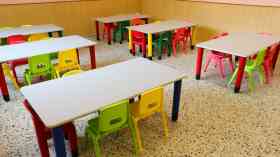Keep clean and improve children’s learning environment
It is important to maintain a high level of cleanliness throughout your building in order to reduce the spread of infection in schools and colleges, which can result in both student and staff absences. Germs spread at a worrying pace and with the threat of harmful bacteria such as MRSA, E. coli and H1N1, regular and effective cleaning is needed to ensure these risks are reduced.
There are many bacteria hot spots in schools including desks, door handles and computer keyboards. These hot spots need to be regularly cleaned, as do all surfaces and floors in the building. The cleaning operatives need to be fully trained and qualified in order to understand how to most effectively and safely clean all areas.
It is vital to make sure washrooms are regularly cleaned and fully equipped. A clean washroom that has plenty of hand wash, and an effective hand drying system, will encourage students to use good hand hygiene practices.
Air Quality
Whilst it is easy to see dirt and contamination in buildings, air cleanliness is much more difficult to identify and therefore it is often ignored as a potential health hazard. However, improving the air quality will be beneficial to the health of the users in the building. Pollution in the air, such as dust, can cause issues with people’s health including respiratory problems, and skin, eye, nose, throat and ear irritations.
Dust is made up of many sources, one of the main components being dead skin cells. A building that is used as a school or college is likely to have a large number of people who use the premises every day, and as a result of this there will be an increase of dust floating in the air.
Dust mites primarily feed on dead skin cells, so the greater amount of dust you have in a building, the more dust mites you will also have. As dust mites are often the main culprits of allergies, it is vital to reduce dust in buildings to control and minimise mites.
Ventilation is the key to improving air quality as dust mites thrive in warm and damp environments. Regular ventilation of rooms, as well as the implementation of dehumidifiers and extractors, can help improve the air quality.
Vacuuming
It is also important to make sure you are regularly and effectively cleaning the building. Vacuuming will dramatically reduce the number of dust and dust mites. There are special systems in place which have been specifically designed to improve air quality.
Using a professional cleaning company can vastly improve the standards of your facility and as such will protect the students and employees from potential outbreaks of infection.
Case Study
The Royal Northern College of Music or RNCM is a conservatoire in Manchester. In addition to being a centre of education, the RNCM also functions as an arts centre holding concerts of all kinds, opera and other musical events.
When trying to contract out cleaning services, Dean Griffiths, RNCM estate service manager, stipulated that they were looking for a company that went “that little bit further in value added terms as well as forward thinking, with a finger on the pulse of all the latest market developments.”
The winning company offers a bespoke capture and removal system, which is not only a more efficient and effective way of cleaning, it has cost saving implications for the client. The system uses a combination of hip type vacuums, which increase productivity and are more user-friendly.
The company’s manager commented: “What you find usually is that the bigger the building, the more time you can save cleaning it. Traditionally, a cleaner does around 2,500 square foot per hour doing all types of cleaning. With this system, production levels are in excess of 4,000 square foot per hour.
“We use microfibre cloth technology for dusting – this means that static electricity is created in the cloth so it will pick up a greater amount of airborne bacteria which is retained by the cloth. Traditional dusting moves contaminated dust back into the air.
“We also use a large, wheeled brute bin around the office area in which waste is emptied into. Normally a cleaner would empty all waste into a black bin bag and need to shift a heavy weight at the end, which is prone to coffee spills on the carpet etcetera.”
The company provides RNCM with daily cleaning services, seven days a week, from 5am until 9.30pm. When the college shuts down at end of term time they concentrate on jobs such as periodic deep cleaning of carpets and upholstery. They employ a dedicated on-site manager who is on hand to deal with any problems that may arise, such as urgent response, spillages or providing labour for events.
Another successful initiative has been the implementation of a new recycling scheme. The cleaning company’s staff helped to oversee the project and helped to raise awareness on campus of the new systems by wearing T-shirts with promotional messaging.
The manager added: “When we tendered for the college we looked at areas including footfall, building profile and staffing levels. With our plan we reduced the number of staff needed to clean and maintain the building by two per day.
“We have had the contract since August 2009, which was originally a 12 month contract with an option to extend. This has now been extended to three years.”
Dean commented: “We carried out a stringent set of requirements from the beginning and they stood out at presentation stage with what they said they would do. They have fulfilled that promise to date and have exceeded our expectations. We now have a better service than previously, a reduced workload and less staffing concerns, and are happy with the experienced team we have onboard.”
Written by Rowena Sait of Ceris Burns International
Latest News
17/12/2025 - 09:31
Ofqual has fined exam board Pearson more than £2 million in total for serious breaches in three separate cases between 2019 and 2023 which collectively affected tens of thousands of students.
16/12/2025 - 09:19
The average funding rates will increase by 4.3% for under 2s, and by almost 5% for 3-and-4-year-olds.
15/12/2025 - 10:30
Local colleges are set to receive £570 million in government funding to expand training facilities in areas such as construction and engineering.
12/12/2025 - 11:39
The government has announced at least £3 billion to create tens of thousands of new specialist SEND places in mainstream schools.
12/12/2025 - 07:07
The findings suggest that children and young people attending schools in the North of England are less likely to take part in and benefit from residential visits.







